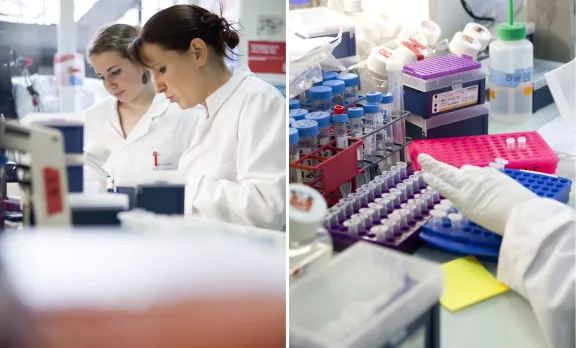Patrick Mehlen Programmed death: the resistance of cancer cells
Patrick Mehlen, Director, Cancer Research Center of Lyon (CRCL) Link to the CRCL
- 2011 • Liliane Bettencourt Prize for Life Sciences



Patrick Mehlen set himself the mission to understand how cancer cells escape programmed cell death. He discovered the key role played by dependence receptors in apoptosis.
The beneficial role of apoptosis or cell death
In our body, cell renewal is strictly controlled by a mechanism known as apoptosis. This form of cell death is a process of self-destruction that occurs when cells become abnormal.
Tumors can develop when abnormal cells escape this programmed death.
But how do cells know that they should self-destruct to prevent causing harm to the body? This question is the specific focus of Patrick Mehlen’s research, which theorises that this mechanism involves sentinels positioned on the surface of cells, which monitor their environment.
Cellular communication: locks and keys
Cells communicate with their environment through receptors and messengers, also known as ligands, which can be likened to locks and keys respectively.
Contrary to the dogma that receptors only function when their ligand is present, Patrick Mehlen has discovered that when a receptor receives no message, this does not necessarily mean that it is silent and inactive. Some locks can function without a key. Known as “dependence receptors”, they trigger programmed cell death in the absence of their ligand.
When the ligand of a dependence receptor is present, this signals that everything is normal and the cell is allowed to survive. In the absence of their ligand, these receptors send a signal that induces cell death.
Cancer and apoptosis resistance
In certain cancers, cells produce their own ligand, thus breaking free from the control of dependence receptors. As a result, they are resistant to apoptosis and multiply uncontrollably, causing tumours.
Patrick Mehlen thus theorises that tumour cell death could be induced by blocking the interaction between their dependence receptor and the ligand they produce.
The Netrin-1 ligand is implicated in 70% of metastatic breast cancers. In 2011, after receiving the Liliane Bettencourt Prize for Life Sciences, Patrick Mehlen’s team developed an antibody against the Netrin-1 ligand. This antibody has proved effective in preventing cancer recurrence in animals.
Identifying the different ligands produced by cancer cells could lead to the development of targeted therapies for each type of cancer.
Patrick Mehlen in a few words
A biologist by training and graduate of the École Normale Supérieure, Patrick Mehlen completed a PhD in Cellular and Molecular Biology at the Lyon 1 University, specialising in the proteins that control cell death.
While conducting post-doctoral research at the Burnham Institute in San Diego, he worked with Dale Bredesen to discover the novel function of “dependence receptors” and their crucial role in apoptosis.
After returning to France, he set up his own research team at the Center of Molecular and Cellular Genetics in Lyon, and demonstrated the multiple roles of dependence receptors in normal cell development, as well as in oncogenesis and neurodegenerative diseases.
In 2011, with the support of the Fondation Bettencourt Schueller, his team developed an antibody shown to be effective in preventing recurrence of certain cancers in animals.
Patrick Mehlen’s work on deciphering the mechanisms of apoptosis is of crucial importance in the search for new therapeutic treatments to fight cancer.
-
1992 PhD in Cellular and Molecular Biology, Lyon 1 University
-
1997 Post-Doctoral Fellowship, The Burnham Institute, La Jolla, California (USA)
-
1998 CNRS Researcher, 1st Class
-
1998 Head of the Apoptosis and Differentiation team, Center of Genetics and Molecular and Cellular Physiology, Villeurbanne, France
-
2004 Head of the Apoptosis, Cancer and Development team, Centre Léon Bérard, Lyon
-
2005 CNRS Silver Medal
-
2006 CNRS Research Director, 1st class
-
2011 Liliane Bettencourt Prize for Life Sciences
Liliane Bettencourt Prize for Life Sciences
The Liliane Bettencourt Prize for Life Sciences rewards each year a researcher under the age of 45 for the excellence of their work and their remarkable contribution to their field of scientific research. This prize is awarded, depending on the year, to a researcher based in France or working in another European country. Thirty winners have been awarded since 1997. From 2023, prize rewards the laureate up to 100,000 euros.
All the award-winners